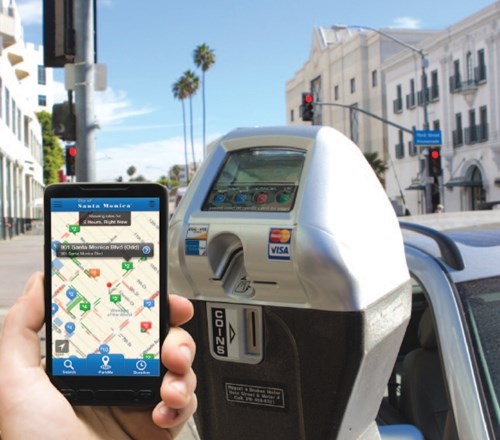Data Drives Parking Decisions in Santa Monica
Employing Technology to Solve Parking Challenges

Santa Monica is a quintessential Southern California beach city, home to the world famous Santa Monica Pier and a vibrant downtown area. Each year, more than 20 million vehicles transcend on 8.5 square miles and nearly 12 million of those vehicles park at the City’s parking meters.
The high volume of meter traffic, limited personnel and financial resources presented challenges for the City. With only three meter technicians to service nearly 6,000 meters, the City needed a cutting edge parking solution. Even a simple rate change using the existing coin-only meters would need to be manually reprogrammed by just three technicians – a daunting and timeconsuming task. As such, Frank Ching, Parking Administrator for the City of Santa Monica, turned to technology to solve the City’s parking problem. In April 2011 the City enlisted vendors to install their latest parking technologies for a trial. As the only single space parking meter vendor able to meet the City’s request, IPS Group, Inc. installed a trial of 150 solar-powered singlespace parking meters and 150 in-ground Vehicle Detection Sensors in high traffic areas of downtown Santa Monica. The meters provided additional payment options such as credit/debit card, smart card and pay-by-cell payment. Within minutes of their initial use, data began to pour into the City’s Data Management System which is a state-of-the-art webbased management system that the City used to gather information on occupancy, average length of stay, and turnover rates.
Smart Parking Meters Provide Additional Functionality
Following the successful trial of the meters, the City procured 6,000 single-space parking meters and 6,000 sensors from IPS - one of the largest deployments of sensors in the US. The installation was completed in just two months, averaging 600+ installed meters per week. The sensor, which is installed underneath the ground, communicates directly with the meter and data is transferred using the available cellular link inside the meter. The meter and sensor work together to provide a wealth of information to the City while also providing some unique features.
Since the installation of the meters, credit card usage has steadily increased. Prior to the deployment of the IPS smart parking meters, credit card usage in the City ranged from 30-37% per month on average. In January 2013, the City recorded its highest rate when 67% of all meter transactions were made by credit card. The trend toward electronic payment has proven to be a win-win for both the City and motorists. When presented with additional payment options, parkers are more likely to pay for the maximum amount of time needed since they are not limited by the number of coins they have in their pocket. In addition, credit card payment is more convenient for the motorist and less expensive for the City – because there are fewer coins in the meter, less frequent coin collection by City staff is required. Furthermore, less frequent coin collection decreases carbon emissions from vehicles used to collect coins which is better for the environment.
The IPS meter-sensor solution offered additional functionalities to the City. Looking to generate higher turnover in popular downtown areas, the City chose to implement the anti-meter feeding function of the smart parking meters. When this function is enabled, motorists are not able to “feed” the meter beyond the allowed two hour time limit, which discourages motorists from parking at the meter for the entire day. The City’s embedded sensors detect when a car has not been moved within the imposed time limit and alert the meter to refuse additional payment. Drivers are forced to move their vehicles or risk getting a ticket. The downtown merchants have welcomed the new technology and reported increased business resulting from higher meter turnover. Another capability realized by the smart parking meters is the ability to “reset” the meters. Once a vehicle has left the parking space, the meter will be reset to zero. The incoming vehicle will then be responsible for their appropriate parking fare. “We employed the reset feature in order to hold people accountable for their own parking,” says Anthony Mazeika, Parking Operations Specialist for the City of Santa Monica. This function alone contributed an additional 10% to parking meter revenues.
Highlights
- Since meter installation the City’s parking meter revenue has increased by 40%
- Uptime has improved to 99.8%
- Sensor reset option has added an additional 10% in revenue
- Credit card usage is up to 67%
The Results
The program’s results have been impressive. Since deploying the IPS meters, meter uptime has averaged 99.8%. In the event that a meter requires maintenance, an alert is generated in the Data Management System and a text message or email is sent to one of the meter techs. There is no need to wait for a customer to call in. Rate changes and demand-based pricing can be implemented remotely via the Data Management System which relieves some of the burden on the City’s three meter technicians. Contested citations are also down because coin jams are quickly resolved and data is available to verify whether a parking fare was paid or not. Revenue has increased nearly 40%, due to the additional payment options and the reset function. In fact the increase in revenue paid for the entire parking modernization program in just 12 months. Although the City has realized financial benefits from the installation of the creditcard enabled meters, Ching feels that the wealth of data the sensors and meters provide is invaluable: “These little things are going to leave a legend behind.”
Looking Ahead
Faced with a high demand and limited parking resources, the City of Santa Monica turned to IPS Group which proved to be the only vendor capable of meeting the City’s needs. Santa Monica was among the first to deploy vehicle detection sensors on a large scale. The City’s upgrade of outdated parking technology and the implementation of new data-driven policies will assist the City in meetings its objective of becoming the most customer friendly city on the coast. Future plans include implementing a universal smart card to pay for all parking, transportation, and purchases at partner merchants throughout the City. The successful deployment of cutting-edge meter and sensor technology in the City of Santa Monica can be regarded as a model for how parking data can be used to guide and implement parking decisions to meet the evolving needs of the City, and how parking data, as just one facet of the larger picture, can help Cities make informed decisions.
About IPS Group, Inc.
San Diego-based IPS Group, Inc. is a design, engineering and manufacturing company focused on low power wireless telecommunications and parking technologies. IPS is proud to manufacture in California and has been delivering world-class solutions to the telecommunications and parking industries for over 15 years. The company is best known for their patented credit card enabled, solar powered single-space parking meter and web-based management system.





Comments
There are no comments yet for this item
Join the discussion